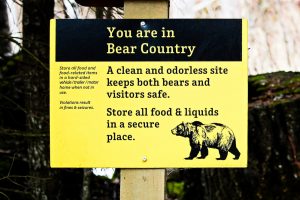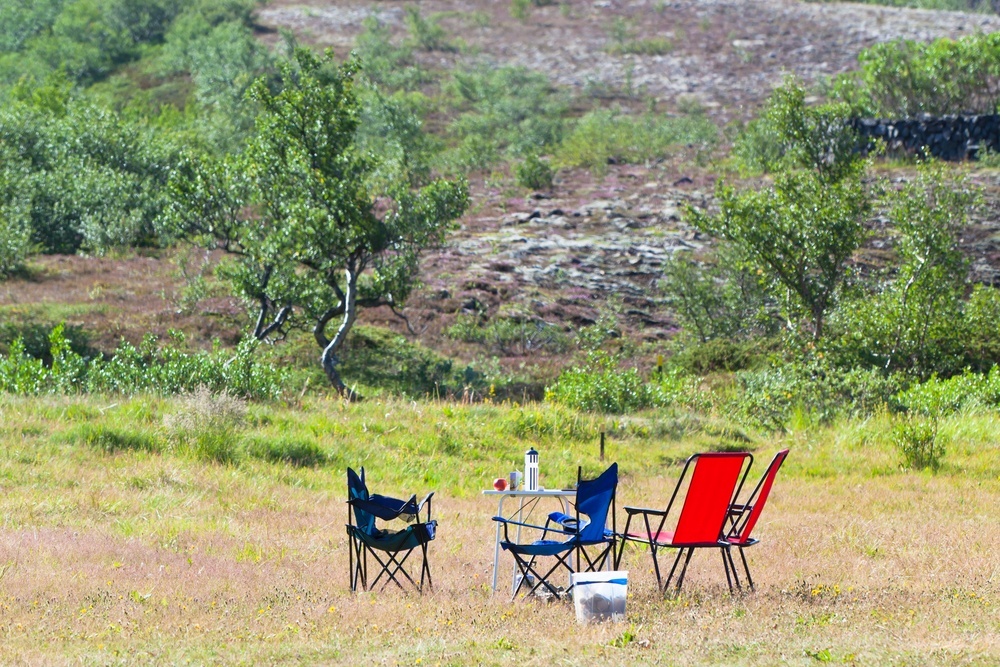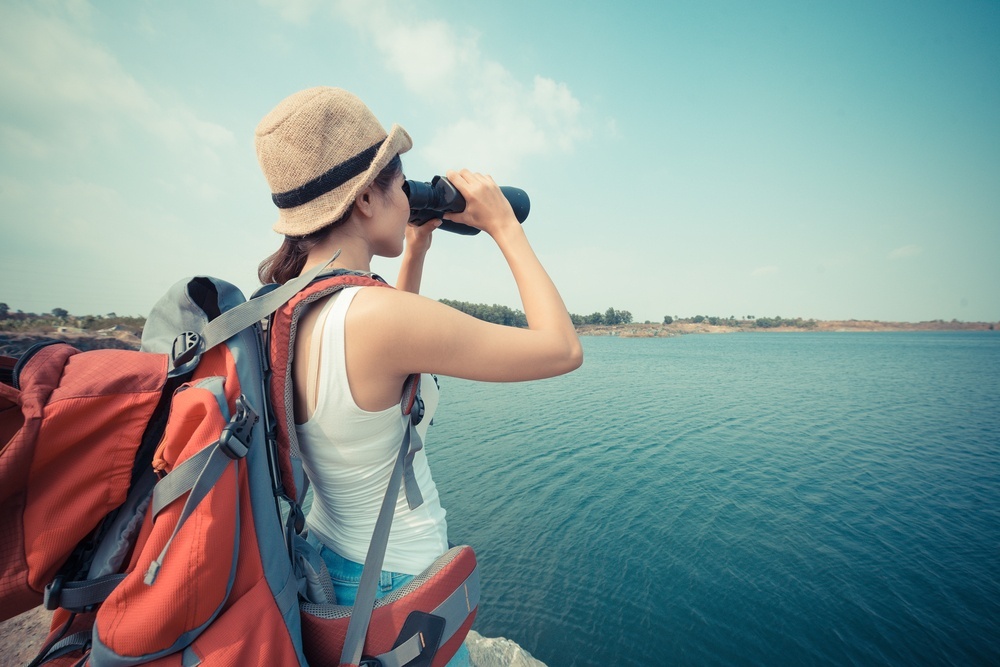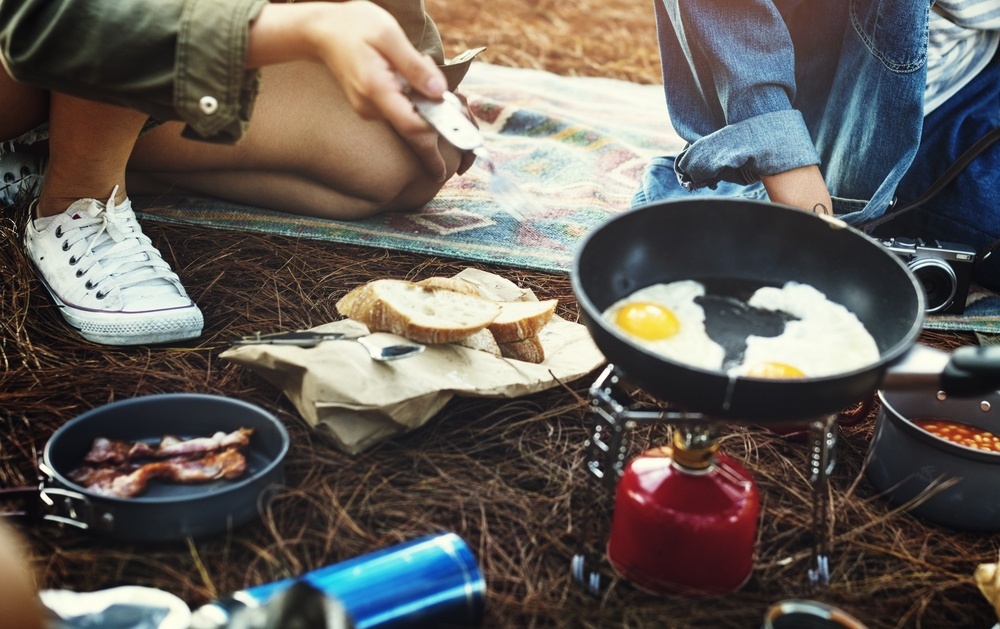As an Amazon Associate I earn from qualifying purchases.
Most people go camping for similar reasons. Spending time in the woods and mountains, along lakes and rivers, or on trails deep within the wilderness provides a relaxing opportunity to recharge, away from the stress, noise, and bustle of modern daily life.
However, an unplanned encounter with a hungry bear in camp is a quick way to turn a good time into a terrifying and dangerous situation.
In order to ensure that your next trip into nature remains a peaceful and safe experience, here are 10 steps to keep bears away from your campsite while camping.

Do your research
Before setting out on any trip, research your destination and plan accordingly. Questions to answer before setting out include: What is the forecast? What are my options for water? Am I entering bear country? If the answer to the last question is yes, this should trigger follow-up steps to mitigate risk.
Trips into bear country always provide the opportunity for a meaningful experience in a pristine setting. You can increase the likelihood of walking away with a good story by doing your research and planning ahead.
Talk to Park Rangers
Upon arriving at the park or campground, you should check-in with a ranger’s office or a campground host. Talk to these people and use their knowledge! This is an excellent opportunity to get the most up-to-date information on local conditions.
Local rangers will inform you of any problem bears in the area, or campground closures related to bear activity. Plus, they are generally charismatic and pleasant people (It’s basically in their job description), and you’re likely to enjoy the conversation and learn something new.
Park employees want you to enjoy your trip as much as you do, avoid excess risk by following their advice.
Bring the appropriate gear, but don’t overpack
Trips into the outdoors are opportunities to simplify life and reduce the everyday clutter. Avoid the temptation to bring everything that fits into your car or pack, AND the kitchen sink.
Go through your gear list and eliminate anything that you could do without for a few days. Every piece of gear you bring is something else to keep track of, increasing the likelihood that you will forget something in your pack or tent that will attract a bear.
Follow local guidelines on food storage
After researching your trip and speaking to rangers you should know the local regulations on food storage. Follow them.
In some areas, bear-hangs are perfectly acceptable to keep food away from bears. As an example, in Yosemite National Park bears know how to take down bear-hangs, and bear canisters are required to keep your food, yourself, and the bears safe. Making sure you get the best bear canister for backpacking will go a long way in helping you meet this guideline!
Prepare and eat meals away from camp
After a grueling day of backpacking it is tempting to sit right in the middle of camp to cook and eat the meal that you’ve been carrying and thinking about all day. This urge must be avoided.
The odor of food preparation will linger around camp long after you’ve enjoyed your undoubtedly delicious meal. To avoid hungry bears sniffing around your sleeping head, find a location at least 100 yards away to use as a kitchen area. A good view of sunset or some rocks that function as a table and/or seats are a plus.
Additionally, locate your bear hang – or store your bear canister – in the kitchen area to consolidate food odor.
NEVER bring food into your tent
This one is pretty simple, just don’t do it.
Human food has an enormous calorie density relative to a bear’s normal food. Bears have senses of smell more powerful than dogs, and cannot resist the temptation of human food.
They will not hesitate to rip through the very thin walls of your tent to get at the smell of potato chips that you spilled a month ago. Avoid this possibility entirely, by making your tent a food-free zone.
Store toiletries and other scented items with your food. (OR just leave them at home!)
Toiletries and other personal hygiene products are generally heavily perfumed with all sorts of natural and artificial odors. These need to be stored away from camp with the food.
Bears are naturally curious, and anything that smells sweet or unnatural will arouse their interest. They don’t know that your Ocean Breeze deodorant or mint flavored toothpaste aren’t food, but they’ll tear through your tent to investigate anyway.
Pack a toothbrush and of course maintain personal hygiene, but getting into the woods is an opportunity to simplify life and reconnect with nature. Embrace your inner trail trash, leave the deodorant at home.
Keep a clean and orderly camp
A messy camp is a disorganized camp. It is easy to forget or overlook things in a disorganized camp, especially after dark.
Keeping a tidy camp ensures that you won’t forget the trail mix in your pack or leave the bag of trash sitting around.
Don’t feed ANY wildlife
Habituating wildlife to human food is one reason that bear encounters are such a problematic occurrence. Wild bears in Yosemite were hand fed for years and eventually learned how to take down bear hangs.
While it may seem harmless to feed the cute squirrel or hungry looking racoon, it is important to remember that bears are omnivores, and will eat other animals given the opportunity. Teaching potential prey species to congregate where humans gather, may have the effect of bringing bears to the area.
Respect the bears
Bears are curious and powerful animals with the ability to sniff out even the slightest hint of food. Keep bears out of your camp by respecting their abilities and remembering that bear country is their home, not yours.
We go to the woods to have a positive experience, and encounters with bears should be an enriching addition to any wilderness trip. However, when a bear enters a campsite expecting to find food, things can turn dangerous very quickly. Stay safe by following the steps outlined above and keep bears out of your camp.
Amazon and the Amazon logo are trademarks of Amazon.com, Inc, or its affiliates.



